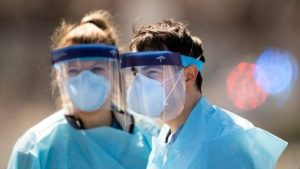 With Covid-19 showing no signs of slowing, much of the US healthcare system is suffering from a lack of personal protective equipment (PPE) for its frontline employees. The shortage is expected to continue for the foreseeable future, potentially leading to hospital workers being put in needless danger of catching the extremely infectious coronavirus.
With Covid-19 showing no signs of slowing, much of the US healthcare system is suffering from a lack of personal protective equipment (PPE) for its frontline employees. The shortage is expected to continue for the foreseeable future, potentially leading to hospital workers being put in needless danger of catching the extremely infectious coronavirus.
Many hospitals and research organizations have been conducting testing to figure out effective and practical ways to decontaminate N95 masks for multiple uses. A recent study published in JAMA researched the various articles published on the subject and found 4 of the best ways to decontaminate N95 masks to maximize the longevity of each mask. As this article by Christopher Cheney at HealthLeaders summarizes:
“To ensure adequate supplies of N95 masks, decontamination of the respirators has become a matter of necessity at many healthcare facilities. The recent research article, which was published in JAMA Otolaryngology—Head & Neck Surgery, identifies four decontamination methods that can recycle N95 masks without compromising the fit of the masks or the filtering material.
- Ultraviolet germicidal irradiation
In a 2018 study, researchers used ultraviolet light to process 15 different N95 mask models contaminated with the H1N1 influenza virus. The ultraviolet germicidal irradiation significantly reduced virus viability in 12 of the 15 models.
In an April 2020 study, ultraviolet germicidal irradiation of N95 masks was effective over three rounds of decontamination. However, the researchers found that the UV light treatment process required more time than other decontamination methods.
In a 2009 study, exposing respirator masks to UV light for 30 minutes was found to be an effective decontamination method.
- Vaporized hydrogen peroxide
The 2009 study also found vaporized hydrogen peroxide treatment effective in decontaminating respirator masks. In that study, researchers exposed contaminated masks to vaporized hydrogen peroxide for 55 minutes.
- Steam treatment
In a 2012 study, microwave-generated steam and oven-generated steam were found effective in treating N95 masks contaminated with H5N1 influenza virus in droplet form.
In a Stanford Medicine study, treating N95 masks with boiling water vapor for 10 minutes was found to be an effective decontamination method for Escherichia coli bacteria.
- Dry heat treatment
The Stanford Medicine researchers also found dry heat effective in treating N95 masks contaminated with Escherichia coli bacteria. The masks were exposed to dry oven heating at 70°C for 30 minutes.
Low-resource decontamination option
For healthcare facilities that lack the resources to adopt active decontamination methods for N95 masks such as UV light or steam heating, “time decontamination” is a viable alternative, the JAMA Otolaryngology—Head & Neck research article says.
In time decontamination, healthcare workers use an N95 mask, then store the mask in a time-stamped paper bag for reuse. “Since the surface viability of the novel coronavirus is presumed to be 72 hours, rotating N95 respirator use and allowing time decontamination of the respirators is also a reasonable option,” the research article says.
If time decontamination is utilized to reuse N95 masks, the Centers for Disease Control and Prevention recommends that masks should be out of service for five days.”
Read the full article here: Coronavirus: 4 Methods Effective in Decontaminating N95 Respirator Masks
For hospitals considering a process to decontaminate PPE to allow for multiple uses during the pandemic, they must have a reliable system in place to make sure they get maximum use out of the PPE without exceeding the allowable limits. Hospitals should also ensure that employees only are able to check out one mask at a time to ensure adequate supply for all frontline workers. Mobile Aspects is working with select healthcare systems on a novel tracking system to track PPE including N95 masks to make sure that maximum usage is reached without exceeding published guidelines. Contact us via our website to find out more.
